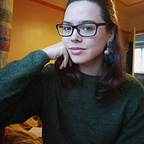The Problem With My Writing? It Lacks Vulnerability
I’ve been working with a therapist lately, trying to unravel my complicated relationship with vulnerability.
It’s not going well.
My problem, as I’ve since learnt, stems from a difficult childhood. I wasn’t abused or neglected in a conventional sense, but my parents were in an unhappy marriage and, understandably, too distracted to invest all the love required to raise a healthy, happy and well-rounded daughter.
I don’t remember much from that time (although I’m told it was awfully dramatic and violent) but, eventually, my dad left. My mum, brother and I became The Three Musketeers — an undefeatable trio, happy despite money concerns and instability.
“Vulnerability is the birthplace of love, belonging, joy, courage, empathy, and creativity. It is the source of hope, empathy, accountability, and authenticity. If we want greater clarity in our purpose or deeper and more meaningful spiritual lives, vulnerability is the path.” ― Brené Brown
Fast-forward a decade to secondary school, and I’ve swallowed a bunch of pills before maths class. What happened between the dismantling of my family unit and this desperate cry for help?
Not much, in all honesty (well, nothing I can remember anyway). And this is why mental health is so damn frustrating — you can never pinpoint the whys.
I only knew I was scared, suffering and surrounded — like the walls of my young life were caving in.
One hospital trip.
One forced regurgitation.
One psych evaluation.
Two angry parents.
Then, nothing at all.
Every time I’ve shown vulnerability, it’s been met with avoidance, confusion or disdain.
The adults in my life didn’t understand why a young girl, who’d never been beaten, was so desperately sad. Hell, I didn’t understand myself — I still don’t. Which is why I’m in therapy, trying to figure out how the ingredients of my life led to suicide attempts, eating disorders and crippling anxiety.
Thankfully, I’m doing this work mostly in hindsight — there’s no more self-harm or starving, but somewhere during the process of recovering, I sealed myself off from the rest of the world.
My logic was simple. The world hurt me, so I hurt myself — shut the world out, and I’ll be safe.
And it worked, at least in the beginning. I turned inwards, focused on healing and got the job done.
But now, my self-imposed emotional exile is no longer serving me. It feels like an immovable barrier between myself, meaningful relationships and the ability to express myself clearly. Which, in turn, impacts my writing.
I don’t know how to piece together the fragments of memories I’ve worked so hard to forget or expose myself to an audience without the fear of rejection. Much like the time between my parent’s separation and half-hearted suicide attempt, there are giant gaps of nothingness followed by explosive drama, without apparent cause and effect.
My journey feels nonlinear, and I don’t know whether it’s possible to tell a story without a beginning, middle and end.
Through therapy, I hope to create a timeline — a tangible map of key life events. Maybe then, I’ll be able to share my experiences properly, in a way that makes sense to others.
In a way that makes sense to me.
Until then, my writing will be as messy and incoherent as my life, and I have to be okay with that. The only other option is to do what I’ve always done — disengage.
“Owning our story can be hard but not nearly as difficult as spending our lives running from it. Embracing our vulnerabilities is risky but not nearly as dangerous as giving up on love and belonging and joy — the experiences that make us the most vulnerable. Only when we are brave enough to explore the darkness will we discover the infinite power of our light.” ― Brené Brown
So, here’s to 2020 — the decade of vulnerability and, in the words of Brené Brown, owning my story.
It’s going to be difficult. Even writing this small, jumbled diary entry feels like a battering ram to my painfully high walls (there’s a moat with crocodiles too).
Perhaps not the best start, but a start nonetheless.
